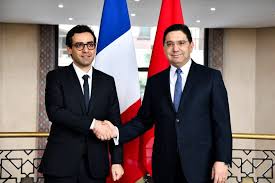APA-Rabat (Morocco) – Zakaria Abouddahab, professor of International Relations at the Mohamed V University in Rabat shares with Apanews the latest ramifcations of the relations between Morocco and France, illustrated by the visit of the head of French diplomacy, Stéphane Séjourné, to Rabat at the end of February.
This visit by a senior French diplomat is a first for a long time.
Interview excerpt below
APA: The visit of the head of the French diplomatic service to Morocco on Monday 26 February, the first by a high-ranking French politician in Rabat for several years, is intended to warm relations between the two countries. What are the reasons for the friction between Paris and Rabat?
Z. Abouddahab: Since the end of the French protectorate over Morocco in 1956, Franco-Moroccan relations have traditionally been excellent, despite a few minor bumps on the road, most of which were quickly overcome. In recent years, however, a number of misunderstandings have taken their toll on relations between the two countries. These include the so-called “Pegasus” affair, which erupted in 2021. This involved Israeli software for intercepting and monitoring telephone calls and electronic messages.
Moroccan intelligence services were accused in France of using this software to access the mobile phone data of certain French political figures, including President Emmanuel Macron. Surprised and, above all, offended by these accusations, the Moroccan authorities immediately initiated legal proceedings in France against the authors of these accusations.
Then there was the case of alleged corruption in the European Parliament, dubbed “Moroccogate” by the French press, which erupted in December 2022 with the arrest in Brussels of MEP Antonio Panzeri. Initially involving Moroccan figures, the affair was later extended to Qatar in what became known as Qatargate. The current head of the Moroccan government, whose name was mentioned in the affair, was prompted to file a libel suit against French MEP José Bové in particular.
“The Moroccan Prime Minister is extremely shocked by the unfounded accusations made by José Bové. These long-standing and unfounded accusations have already been the subject of a final conviction by the 17ᵉ Correctional Chamber of the High Court of Paris on 16 October 2018. This is a scandalous challenge to his honour and honesty,” said Olivier Baratteli, the lawyer for the head of the Moroccan government, at the time.
Rabat had already reacted badly to the adoption of a resolution in the European Parliament in June, initiated and supported by MEPs close to the French president, which accused Morocco of failing to honour its commitments, in particular to the Convention on the Rights of the Child.
The tightening of visa requirements by the French authorities for Moroccan citizens wishing to travel to France from September 2021 was also not welcomed by the Moroccan government. Less directly, the normalisation of relations between Morocco and Israel at the end of 2020, without the involvement of Paris, does not seem to have been much appreciated in France.
Then there is the question of the Sahara. Still considered by Moroccans to be the “great national cause,” this issue has been openly presented by Rabat, since the royal speech on the occasion of the Throne Day in August 2022, as “the prism through which Morocco views its international environment and the yardstick by which the sincerity of the friendships and the effectiveness of the partnerships that the Kingdom establishes are measured.”
Although Paris has long supported the autonomy plan proposed by Rabat for this territory under Moroccan sovereignty, the Moroccan authorities have made no secret of their desire to see France finally recognise the Moroccan nature of the Sahara, especially now that this has been accepted by most of the Kingdom’s friends, led by the United States.
APA: What explains this sudden reconciliation between the two countries?
Z. Abouddahab: In reality, the two countries have always continued to discuss and exchange views through various channels. But recently there have been gradual signs of a détente between the two capitals. The position of France’s permanent representative to the UN, who recently made clear his country’s support for Morocco’s plan for autonomy in the Sahara, was well received in Rabat. The audience granted by His Majesty the King to the French ambassador in Rabat when he presented his credentials was much appreciated in Paris. The recent appointment of Samira Sitail as Moroccan ambassador to France, a post that has been vacant since January 2023, was warmly welcomed by the French authorities.
APA: In Rabat, the head of French diplomacy announced a new “roadmap” for deepening relations between the two countries. What will this roadmap include?
Z. Abouddahab: The exact content of this roadmap is not yet clear. A meeting of the Franco-Moroccan Joint Commission is planned for the coming weeks. Visits by senior officials to both countries are also planned. Moroccan Foreign Minister Nasser Bourita is due to visit France soon. The French Minister for the Economy, Bruno Le Maire, is expected in Morocco before the end of April. An official visit to Morocco by President Macron himself is not out of the question in the short term.
If all this is crowned by a change in the French position on the Sahara issue in the direction Rabat would like to see, there is little chance that relations between the two countries will suffer the kind of upheavals they have recently witnessed.
HA/los/lb/as/APA


